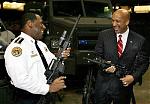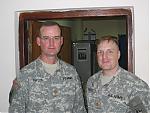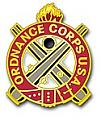Why shouldn't NCO's contribute to their branch-specific professional journals? (
Armor,
Engineer,
Fires,
Infantry,
MI - etc.)
1. As professionals in their fields, NCOs have a lot of insights to offer - and many already do. If the pieces written by officers greatly outnumber those by NCOs just remember that it is the long hours put in by the NCOs who actually run their units that permit the officers the free time to sit down and compose those articles.
2. I tend to try and avoid general statements of value or the lack thereof, and this one really illustrates the reason why. As an NCO who has trained and led soldiers in the MI field - which has a fairly high ratio of college grads - I have to say that many of those qualities were sorely lacking in the educated young'uns.
3.
...recognize patterns, analyze situations, think about contingencies, solve problems, and weigh trade-offs.... - you'd think that a college grad would be an instant intel professional. But many of the kids - some with Masters - couldn't recognize a pattern if I picked up a stack of reports and whopped them upside the head with'em. Even the ones with talent require effective training and mentoring.
4. Better communicators? I actually had a Harvard MBA at one time who couldn't verbally communicate an opinion if you hit her with a cattle prod. To this day I have no idea how she made it out of the HUMINT course at Huachuca (3 recycles!).
5. Don't even get me started on the ability to write better. Not only was that myth shattered many thousand times over when reviewing and editing reports produced by these young Einsteins, but to this day, in editing reports produced by other highly educated corporate warriors in the private sector, I will state with firm conviction that a college degree does not ensure that a given individual will "write better".
6. And "intellectual curiousity"? For far too many that curiosity only extends to getting that degree in an effort to get ahead. With the sheepskin in hand, the fairhaired minimal achievers turn off the intellectual curiosity and go back to narrow vision and preconceived perceptions of our grand world.
7. For some, education truly opens up their mind and provides knowledge and experience that they are able to draw upon in many different contexts later in life. For many, its just another few years spent not having to work, doing just enough to get by, while they party away their free time.
8. A good NCO (with or without a college degree) can separate the wheat from the chaff and attempt to mentor the kids with talent to eventually replace him - while spending the bulk of his time trying to mold the rest into acceptable soldiers, and a disproportionate amount of time dealing with the isolated problem children.
9. Education is a not a panacea to any of the issues facing the force. The slackers and minimal achievers will leap, frothing at the opportunity to leave the Army temporarily to attend school while many with real talent will have to be dragged kicking and screaming to be forced to sit down in a classroom. (That has long been the characteristic of filling TRADOC NCO instructor positions.....)
10. However, having said all that, I do agree that more educational opportunities should be provided to good NCOs. There is certainly a clear disparity regarding the amount of time many officers are provided with educational opportunities compared to NCOs (especially in the MI field). But I do not support an across-the-board mandate.












Bookmarks